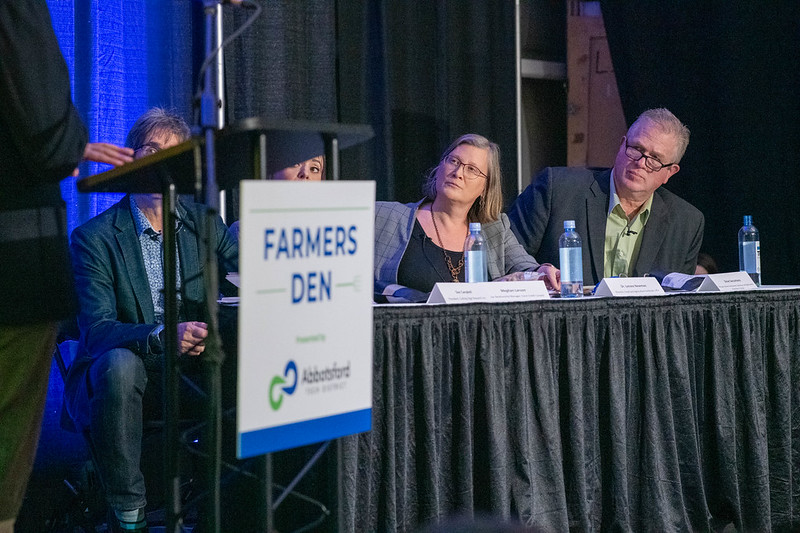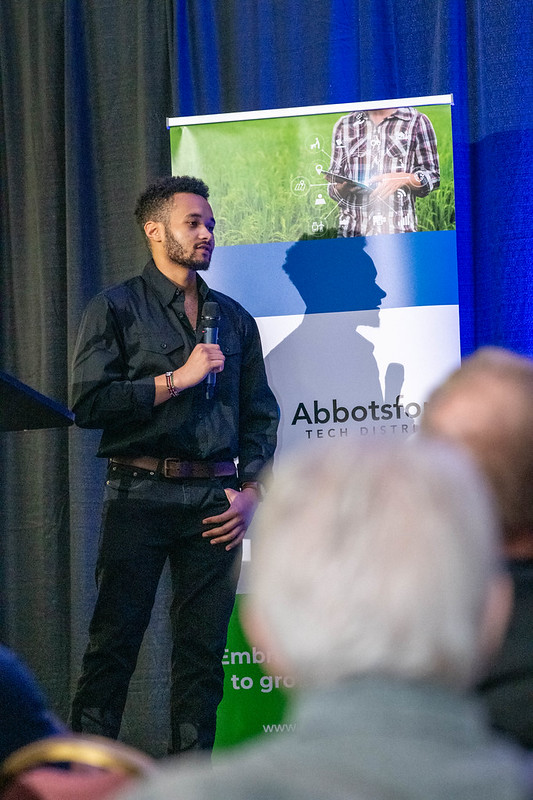Farmer’s Den debuts with UFV professor and student in the spotlight

A UFV professor and student played key roles in the launch of Farmer’s Den at the recent Pacific Agriculture Show in Abbotsford. Lenore Newman, director of UFV’s Food and Agriculture Institute (FAI) was a judge for the pitch show, inspired by television’s Dragon’s Den. Meanwhile, Mwenda Dyck, a student in UFV’s Agriculture Technology department, made one of four pitches in the Seedlings category, which was for students or recent graduates with emerging agricultural companies or ideas for an agri-business. The prize was $10,000.
“Agriculture is an industry that affects every single person on this planet, and what gets me so fired up is seeing other young people who are hungry to make some new waves in this industry and carve out their own path,” said Dyck, who called Farmer’s Den a great experience. “Seeing them get after it and having something like this to support us, that’s so encouraging to me.”
Each presentation was five minutes long, followed by 10 minutes of questions from the judges.
Dyck practiced for Farmer’s Den by making mock pitches to fellow students, and UFV Agriculture Technology department head Renee Prasad. He still had nerves the morning of Farmer’s Den on Jan 26, and said he was thankful that he was the final presenter.
“It wasn’t as intimidating as Dragon’s Den might be, but it was still nerve-wracking,” he said, laughing.
Dyck’s pitch centered around a local vertical farm that would produce microgreens in a sustainable and cost-effective way, to make the food accessible to everyone.
“A big focus of my business is serving the local community, which would be within about 60 kilometres of my farm,” Dyck says. “I believe one of the key ways to combat food insecurity is by implementing intensive local food systems. My farm would be low barrier for entry, easier to invest in than say an ultra high-tech millions-of-dollars facility.
“I want it to be a scalable system that can be plugged into communities both local and abroad.”
Dyck said it was helpful that the panel of judges, including Newman, were familiar with the agriculture industry. Newman is an expert among experts when talking agriculture. Dyck says there was no need to educate the judges as he pitched, which “took a bit of the pressure off.”
“I could focus on pitching the business itself,” he says. “Lenore was a great judge. She asked very, very great questions for not just me, but all the pitchers there. All the judges were really good. You go in there thinking it’s going to be scary and they’ll ask questions you can’t answer. But they provided lots of insight for my business and the other pitchers.”

Launched by Abbotsford Tech District, the competition’s MC was Abbotsford Chamber of Commerce CEO Alex Mitchell, with Abbotsford Tech District Chief Strategy Officer Gavin Dew announcing the winners. Dyck came up short in the end, but he felt good about his effort and said he was inspired seeing young people taking charge in the agricultural space.
Newman agreed, and said it’s why she was so happy to accept the invitation to judge Farmer’s Den.
“I serve as a science advisor for Creative Destruction Labs Rockies, and believe encouraging innovation is critical to our future food security and to the development of an agricultural technology ecosystem,” Newman said. “The chance to have some fun and help some entrepreneurs right here in Abbotsford? Of course, I gave that a big thumbs up!”
Newman said she was interested to see how the pitchers would communicate under pressure and within a tight timeline. She believes you can learn a lot about an individual or team by how well they can think on their feet when the stakes are high.
She was impressed by Dyck and the other competitors and encouraged by the ideas they presented.
“Agriculture is built on technology,” Newman said. “We’ve been improving food production for 10,000 years and we can’t ever stop, especially as we struggle to keep ahead of our climate challenges while the population grows. We must constantly innovate to produce more food with less inputs. Agriculture never stays still, and if Canada is going to compete on the global stage, we need to encourage our home grown talent.
“There are a lot of great ideas out of there ready to be brought to market.”





